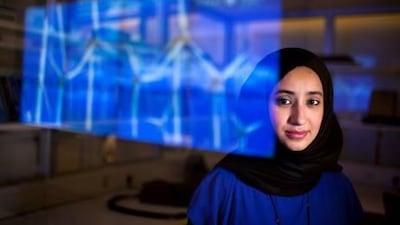ABU DHABI // Rana Qudaih plans to convert plastic waste into fuel. Brian Warshay wants to grow a seawater plant that could power jet engines. Pei-yun Lin hopes to reduce carbon emissions from water and electricity plants.
Masdar graduates: First graduates explain their plans for a brave new sustainable world.
Last Updated: June 2, 2010
Counting benefits in renewable energies Hanan al Shemeili "mines" for patterns and prevalence of phrases, which will be used as indicators as to how technologies will fare. Read article
Model design for green jet fuel A student is researching ways of turning a plant into jet fuel. Read article
Dump utility subsidies, carefully A graduate says government-subsidised utilities harm the environment. Read article
Finally, a purpose for plastic bags A young researcher plans to convert the most common kind of plastic into fuel. Read article
New balance of power and water A student says she has a more environmentally friendly way of producing water and power. Read article
Wafa searches for pick of crop A student has been asked to find the best place to farm Salicornia, a plant that can grow in the harshest climate of the desert. Read article
Capturing risks in carbon storage A researcher is looking to minimise the challenges associated with carbon-capture technology. Read article
They are among the first batch of students who will graduate from the Masdar Institute of Science and Technology at a ceremony in the capital on Sunday.
Today seven of the new graduates describe to The National their plans to make the world a more sustainable environment, starting with Abu Dhabi.
"I have always cared about the Earth and how we can reduce our footprint on this Earth," Ms Lin says. "I believe the low-carbon lifestyle is what the future is supposed to be."
The Masdar Institute, which offers only graduate courses, is part of a broader government effort to shift from an oil-based economy to a sustainable knowledge-based economy, and make Abu Dhabi an international hub for alternative energy.
Mubadala, the strategic investment company controlled by the Abu Dhabi Government, owns the university.
Developed by the Abu Dhabi clean energy company Masdar, the hi-tech campus is at the heart of Masdar City, which the company hopes will be the world's biggest carbon-neutral development.
Since classes began in 2009, the Masdar Institute has been looking for ways to overcome obstacles to the emirate's sustainability, such as the scarcity of water.
Limited rainfall and salty soil have created barriers to the emirate's attempts to make the best use of its desert and coastline. However, students at the Masdar Institute are looking for ways to solve these problems. One project would create an integrated seawater agriculture system to cultivate plants that can tolerate salt.
Projects are under way at Masdar to transform the enormous waste that Abu Dhabi produces each day into useful raw material that can be recycled, or even turned into fuel.
Researchers at Masdar are also looking into other innovative projects. One group is developing lighter and safer aircraft. Another is investigating better ways to design microchips.
All are geared towards making life on the planet more sustainable.

